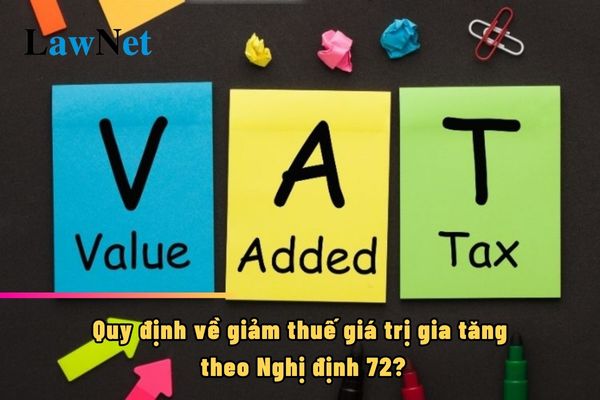What are regulations on VAT reduction in Vietnam according to Decree 72?
What are regulations on VAT reduction in Vietnam according to Decree 72?
Pursuant to Clause 1, Article 1 of Decree 72/2024/ND-CP regulating the reduction of value-added tax (VAT) as follows:
- VAT reduction for groups of goods and services currently subject to a 10% tax rate, except for the following groups of goods and services:
+ Telecommunications, financial activities, banking, securities, insurance, real estate businesses, metal and prefabricated metal products, mining products (excluding coal mining), coke, refined petroleum, chemical products. Details in Appendix I issued with Decree 72/2024/ND-CP.
+ Goods and services subject to special consumption tax. Details in Appendix II issued with Decree 72/2024/ND-CP.
+ Information technology products and services as defined by information technology law. Details in Appendix III issued with Decree 72/2024/ND-CP.
+ The VAT reduction for each type of goods and services specified in Clause 1, Article 1 of Decree 72/2024/ND-CP is uniformly applied at import, production, processing, and commercial trading stages.
For extracted coal items sold (including coal that is mined and then sorted according to a closed process before sale) are eligible for VAT reduction.
Coal products listed in Appendix I issued with Decree 72/2024/ND-CP that fall under stages other than the selling of extracted coal are not eligible for VAT reduction.
Corporations and economic groups executing a closed selling process also qualify for VAT reduction concerning extracted coal items.
In the case of goods and services mentioned in Appendices I, II, and III issued with Decree 72/2024/ND-CP that are not subject to VAT or subject to a 5% VAT rate according to VAT Law, they shall be handled according to the VAT Law and are not eligible for VAT reduction.

What are regulations on VAT reduction in Vietnam according to Decree 72? (Image from the Internet)
What is the VAT reduction rate in Vietnam according to Decree 72?
According to Clause 2, Article 1 of Decree 72/2024/ND-CP stipulating the VAT reduction rate as follows:
- Business establishments calculating VAT by the deduction method are eligible for an 8% VAT rate on goods and services specified in Clause 1, Article 1 of Decree 72/2024/ND-CP.
- Business establishments (including business households and business individuals) calculating VAT based on a percentage rate on revenue receive a 20% reduction in the percentage rate for calculating VAT when issuing invoices for goods and services eligible for VAT reduction as decreed in Clause 1, Article 1 of Decree 72/2024/ND-CP.
In addition, the VAT reduction will be carried out as follows:
- For business establishments specified at Point a, Clause 2, Article 1 of Decree 72/2024/ND-CP, when preparing VAT invoices providing goods and services eligible for VAT reduction, the VAT rate line shall display “8%”; VAT amount; and total amount due from the buyer.
Based on the VAT invoice, the selling business declares output VAT, and the buying business declares input VAT deduction according to the reduced tax amount indicated on the VAT invoice.
- For business establishments at Point b, Clause 2, Article 1 of Decree 72/2024/ND-CP, when preparing sales invoices providing goods and services eligible for VAT reduction, in the “Amount” column, all amounts of goods and services before reduction must be recorded, and the line “Total amount of goods and services” should reflect the amount reduced by 20% based on the revenue percentage rate, with a note: “reduced by... (amount) corresponding to 20% of the percentage rate to calculate VAT according to Resolution No. 142/2024/QH15”.
Until when is the balance of supply and demand for goods and services after VAT reduction maintained?
According to Article 2 of Decree 72/2024/ND-CP it is regulated as follows:
Effect and Implementation
1. This Decree is effective from July 1, 2024, to December 31, 2024.
2. Ministries, according to their functions and responsibilities, and the People's Committees of centrally affiliated provinces and cities are tasked with coordinating related agencies to disseminate, guide, inspect, and supervise to ensure consumers understand and benefit from the VAT reduction as stated in Article 1 of this Decree, focusing on solutions to stabilize the supply and demand of goods and services subject to VAT reduction to maintain market price stability (pre-VAT price) from July 1, 2024, to December 31, 2024.
3. During implementation, if difficulties arise, the Ministry of Finance is assigned to provide guidance and resolution.
4. Ministers, heads of ministerial-level agencies, heads of agencies under the Government of Vietnam, Chairpersons of People's Committees of centrally affiliated provinces and cities, and relevant enterprises, organizations, and individuals are responsible for implementing this Decree.
Thus, the balance of supply and demand for goods and services post VAT reduction is maintained from July 1, 2024, to December 31, 2024.

